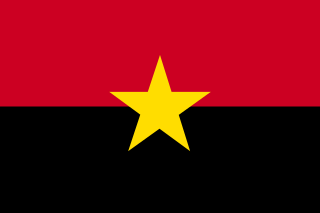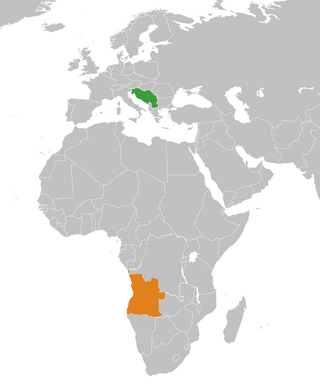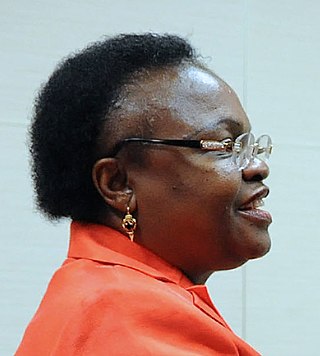
The People's Movement for the Liberation of Angola, from 1977–1990 called the People's Movement for the Liberation of Angola – Labour Party, is an Angolan social democratic political party. The MPLA fought against the Portuguese Army in the Angolan War of Independence from 1961 to 1974, and defeated the National Union for the Total Independence of Angola (UNITA) and the National Liberation Front of Angola (FNLA) in the Angolan Civil War. The party has ruled Angola since the country's independence from Portugal in 1975, being the de facto government throughout the civil war and continuing to rule afterwards.

António Agostinho Neto was an Angolan communist politician and poet. He served as the first president of Angola from 1975 to 1979, having led the Popular Movement for the Liberation of Angola (MPLA) in the war for independence (1961–1974). Until his death, he led the MPLA in the civil war (1975–2002). Known also for his literary activities, he is considered Angola's preeminent poet. His birthday is celebrated as National Heroes' Day, a public holiday in Angola.

Mário Coelho Pinto de Andrade was an Angolan poet and politician.

The Angolan War of Independence, known as the Armed Struggle of National Liberation in Angola, was a war of independence fought between the Angolan nationalist forces of the MPLA, UNITA and FNLA, and Portugal. It began as an uprising by Angolans against the Portuguese imposition of forced cultivation of only cotton as a commodity crop. As the resistance spread against colonial authorities, multiple factions developed that struggled for control of Portugal's overseas province of Angola. There were three nationalist movements and also a separatist movement.

The Forças Armadas de Cabinda (FAC), or Armed Forces of Cabinda, is the armed wing of the political Cabindan nationalist group Frente para a Libertação do Enclave de Cabinda. the Movement for the Liberation of the Enclave of Cabinda (MLEC) in Léopoldville in 1959, chaired by Luis Ranque Franque, the Action Committee of the Union Nationale Cabindaise (CAUNC) in Brazzaville in 1961, chaired by Henrique N'zita Tiago and the Alliance du Mayombe in Pointe-Noire in 1962, chaired by António Eduardo Sozinho Nzau. In 1963, the three separatist political movements merged to found the Front for the Liberation of the Enclave du Cabinda (FLEC), based in Pointe-Noire.
Américo Alberto de Barros e Assis Boavida, generally known as Dr. Américo Boavida, was an Angolan physician active in his country's nationalist movement.
Lúcio Rodrigo Leite Barreto de Lara, also known by the pseudonym Tchiweka, was an Angolan revolutionary, physicist-mathematician, politician, anti-colonial ideologist and one of the founding members of the Popular Movement for the Liberation of Angola (MPLA). He served as General Secretary of the MPLA during the Angolan War of Independence and Angolan Civil War. Lara, a founding member of the MPLA, led the first MPLA members into Luanda on 8 November 1974. He swore in Agostinho Neto as the first president of the country.
The Alvor Agreement, signed on 15 January 1975 in Alvor, Portugal, granted Angola independence from Portugal on 11 November and formally ended the 13-year-long Angolan War of Independence.
The Eastern Revolt is an Angolan nationalist organization that fought in the war of independence from Portugal under the leadership of Daniel Chipenda. The RDL drew its support from the Ovimbundu ethnic group.
Daniel Chipenda was an Angolan revolutionary that fought in the Angolan War of Independence, serving as the People's Movement for the Liberation of Angola's (MPLA) field commander in the Eastern Front before founding and leading the Eastern Revolt, a faction of the MPLA. He later joined the National Liberation Front of Angola (FNLA), but left, rejoined the MPLA, and left again in July 1992.
The military history of Angola is marked by a series of conflicts rooted in tribal conflicts, colonialism and the Cold War. During the Cold War, Angola was involved in struggles between Western powers and South Africa with the help of the Soviet Union and Cuba.
Sambizanga is a 1972 film directed by Sarah Maldoror and written by Maldoror, Mário Pinto de Andrade, and Maurice Pons, based on the 1961 novella The Real Life of Domingos Xavier by José Luandino Vieira. Set in 1961 during the onset of the Angolan War of Independence, it follows the struggles of Angolan militants involved with the Popular Movement for the Liberation of Angola (MPLA), an anti-colonial political movement. Maldoror co-wrote the screenplay with her husband, who was a leader within the MPLA. Sambizanga was the first feature film produced in Angola and by any Lusophone African country. Maldoror was the first woman to make a feature film in Africa.

During Angola's civil war, Cuban forces fought alongside the Marxist–Leninist People's Movement for the Liberation of Angola (MPLA) government; against the Western-backed National Union for the Total Independence of Angola (UNITA) and National Liberation Front of Angola (FNLA) guerrillas who were aided by the South-African army. The present day outcome of the war resulted in the MPLA changing from a Marxist–Leninist party to a multi-party democratic system based on neoliberal principles. From an economic standpoint, Cuba has lost its preferred status among Angolans and South Africa has become the biggest single investor and trading partner with Angola.
This article deals with the activities of the U.S. Central Intelligence Agency (CIA) in Angola. The list of activities may be incomplete due to the clandestine nature of the subject matter.
José Mendes de Carvalho, known by his nom de guerreHoji-ya-Henda, was a guerrilla fighter of the People's Armed Forces for the Liberation of Angola (FAPLA). Now remembered as a folk hero in Angola, he was killed during the Portuguese Colonial War.
The Conference of Nationalist Organizations of the Portuguese Colonies was an organization for coordination and cooperation between the national liberation movements of the Portuguese colonies in Africa during the Portuguese Colonial War.

Angola–Yugoslavia relations were historical foreign relations between Angola and now split-up Socialist Federal Republic of Yugoslavia. During the Cold War both countries actively participated in the work of the Non-Aligned Movement.

Luzia Pereira de Sousa Inglês Van-Dúnem is an Angolan politician, feminist and expert in military telecommunications. She is a member of the Angolan National Assembly, as a member of the Popular Movement for the Liberation of Angola (MPLA).
Angola's Independence Day commemorates the proclamation of national independence, on 11 November 1975. It honors all those who sacrificed their lives during the struggle against Portuguese rule and colonialism, and remembers all those who died in the liberation war and subsequent conflicts.








